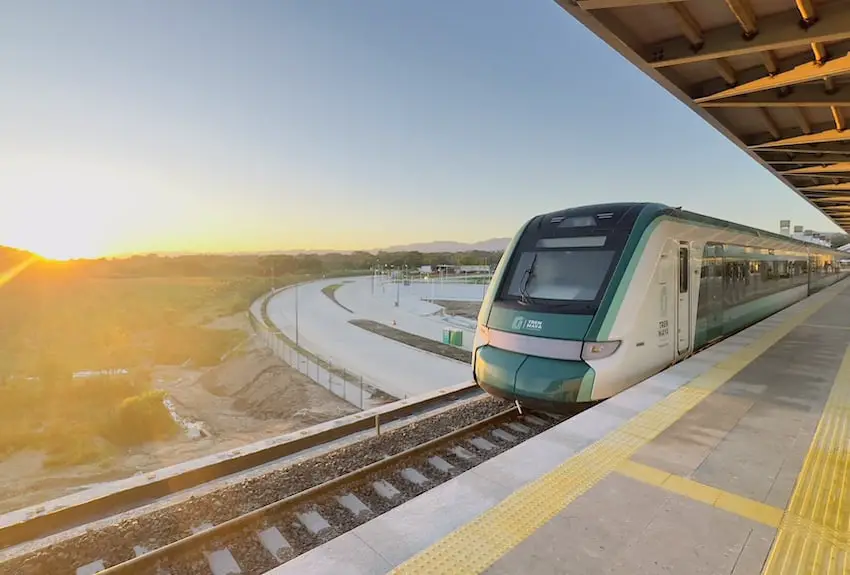Mexico allots nearly US $8B to expand passenger train network

On the campaign trail, Claudia Sheinbaum promised that the return of passenger trains would be a fundamental objective of her administration. Now the Mexican president is putting her words into action.
On Thursday, Sheinbaum announced that the government has set aside 157 billion pesos (US $7.8 billion) in its 2025 budget to begin installing 3,000 kilometers of track connecting Mexico City with northern regions.

The ambitious project is set to begin in April 2025 with three passenger train routes, two of which would connect Mexico City to northern border cities: México City-Nuevo Laredo and México City-Nogales. The third route would connect Pachuca — about 90 kilometers north of the capital — with the new Mexico City airport.
The construction would be done in non-contiguous fashion, the newspaper El Economista reported, so as to benefit the largest number of people as the project advances.
For instance, explained Andrés Lajous, in charge of overseeing the project, construction would begin with lines connecting Mexico City with Querétaro and Saltillo with Nuevo Laredo.
Querétaro — one of the country’s most important cities in terms of industrialization and tourism, — is only 225 kilometers northwest of Mexico City, but traveling by car can take up to four hours. The Saltillo-Nuevo Laredo trunk line would connect Saltillo, a state capital featuring a large automotive industry, with a border city often considered “the customs capital of Latin America.”
Boosting her predecessor’s legacy
The unprecedented investment in passenger train lines — a mode of transportation abandoned in Mexico in the second half of the 20th century as automobiles became more popular — is a continuation of a policy begun by former President Andrés Manuel López Obrador, whose term ended on Sept. 30.
In her inauguration speech on Oct. 1, Sheinbaum reiterated her promise to continue López Obrador’s work. “We are proudly reviving passenger train service, because it means regional development, jobs, tourism and shared prosperity,” she said, according to the BBC.
López Obrador’s flagship project was the Maya Train, a US $30 billion investment that refurbished old train tracks, built stations, access roads and hotels for a route that traverses five states located in the Yucatán Peninsula.


The Interurban Train (US $10 billion) and the Interoceanic Train (US $1 billion) were two other projects favored by López Obrador. The former connects Mexico City with Toluca, the capital of México state 65 kilometers to the west, while the latter links the Gulf Coast port of Coatzocoalcos, Veracruz, with the Pacific port of Salina Cruz, Oaxaca, about 300 kilometers away.
Whereas the Interurban Train — which will be completed in the coming months — provides passenger service, the Interoceanic Train offers both passenger and freight service.
Getting back on track
Other focal points of the project, according to the BBC, include the restoration of the once-iconic Mexico City-Veracruz train line and the Querétaro-Guadalajara connection that will comprise part of the Mexico City-Nogales route.
The government also plans to modify the Maya Train railway to accommodate freight service.
Lajous explained that there would be four phases to the project: first, laying 786 kilometers of track through 2026; second, installing 910 kilometers through 2027; third, building 1,145 kilometers through 2028; and the fourth phase, completing the final 552 kilometers.
Sheinbaum and Lajous emphasized that the private sector is a willing participant as construction will generate considerable economic benefits, particularly at the local level.
Lajous estimates that the new projects will directly and indirectly create roughly 490,000 jobs.
Suppliers, such as construction companies ICA, Carso and Mota Engi, will also benefit. The trains themselves will likely be manufactured by the French-Canadian firm Alstom-Bombardier, which has a factory in the state of Hidalgo.
“The returns on investment in infrastructure, in a country that needs infrastructure, are enormous for the government and society,” Lajous told the BBC.
With reports from El Economista and BBC
Source: Mexico News Daily

